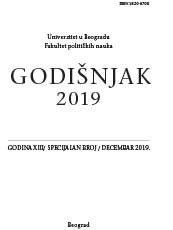Izbori za Evropski parlament u doba krize
European Elections in the Time of Crisis
Author(s): Vladimir D. FilipovićSubject(s): Electoral systems, EU-Approach / EU-Accession / EU-Development
Published by: Fakultet političkih nauka Univerziteta u Beogradu
Keywords: European Union; reforms; elections; European Parliament; legitimacy; parlamentarism; Members of the European Parliament;
Summary/Abstract: Political and institutional circumstances in the European Union have changed significantly after the global economic crisis and the launch of the process of UK leaving the European Union. These events have triggered a debate on Union reform with no unified position formed, in particular amongst the most influential members – France and Germany, which opens a new political crisis. In this context, elections to the European Parliament were conducted, and with two important results. The first being the high turnout, and the second one a ”European” commitment. With a high turnout in the context of the growing crisis, citizens have raised the stake and expressed the expectation that the crisis will be resolved. Secondly, beside the increasing support to the Eurosceptic parties, the “European” commitment remains significantly overpowering. After the elections, the European Parliament comes out empowered by the clear legitimacy it can use to strengthen its position in the political arena. MEPs have the opportunity to engage in political struggles with an unambiguous mandate in the coming period, and the first test will be the election of the President of the European Commission.
Journal: Godišnjak FPN
- Issue Year: 13/2019
- Issue No: Spec.
- Page Range: 93-109
- Page Count: 17
- Language: Serbian

